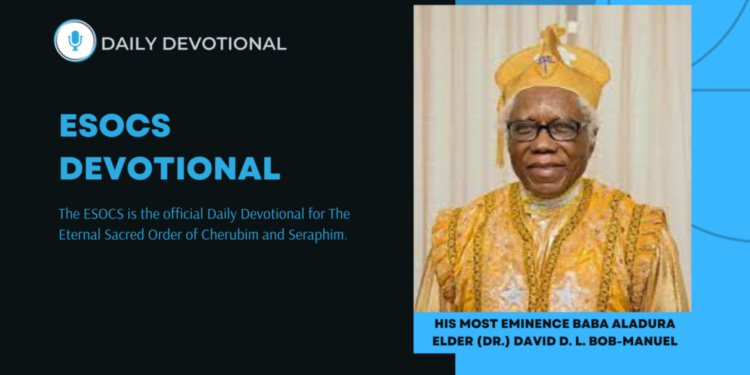ESOCS Devotional 2 October 2024 – Shrewd Manager
MEMORY VERSE: “I have resolved what to do, that when I am put out of the stewardship, they may receive me into their houses.”Luke 16:4
TEXT: LUKE 16:1-18
He also said to His disciples: “There was a certain rich man who had a steward, and an accusation was brought to him that this man was wasting his goods. 2 So he called him and said to him, ‘What is this I hear about you? Give an account of your stewardship, for you can no longer be steward.’
3 “Then the steward said within himself, ‘What shall I do? For my master is taking the stewardship away from me. I cannot dig; I am ashamed to beg. 4 I have resolved what to do, that when I am put out of the stewardship, they may receive me into their houses.’
5 “So he called every one of his master’s debtors to him, and said to the first, ‘How much do you owe my master?’ 6 And he said, ‘A hundred measures of oil.’ So he said to him, ‘Take your bill, and sit down quickly and write fifty.’ 7 Then he said to another, ‘And how much do you owe?’ So he said, ‘A hundred measures of wheat.’ And he said to him, ‘Take your bill, and write eighty.’ 8 So the master commended the unjust steward because he had dealt shrewdly. For the sons of this world are more shrewd in their generation than the sons of light.
9 “And I say to you, make friends for yourselves by unrighteous mammon, that when you fail, they may receive you into an everlasting home. 10 He who is faithful in what is least is faithful also in much; and he who is unjust in what is least is unjust also in much. 11 Therefore if you have not been faithful in the unrighteous mammon, who will commit to your trust the true riches? 12 And if you have not been faithful in what is another man’s, who will give you what is your own?
13 “No servant can serve two masters; for either he will hate the one and love the other, or else he will be loyal to the one and despise the other. You cannot serve God and mammon.”
14 Now the Pharisees, who were lovers of money, also heard all these things, and they derided Him. 15 And He said to them, “You are those who justify yourselves before men, but God knows your hearts. For what is highly esteemed among men is an abomination in the sight of God.
16 “The law and the prophets were until John. Since that time the kingdom of God has been preached, and everyone is pressing into it. 17 And it is easier for heaven and earth to pass away than for one tittle of the law to fail.
18 “Whoever divorces his wife and marries another commits adultery; and whoever marries her who is divorced from her husband commits adultery.
Read Other ESOCS Devotional Here
The key to security about the things we need is not anxious earning and saving but trustworthy service and spending. If God can trust us to spend our money to meet the needs of others, then the money we ourselves need will also be provided. This is the point of the parable of the dishonest manager. In it, a manager squandered his master’s property and, as a result, was notified he will be fired. He used his last days on the job to defraud his master further but there was a strange twist to how he did it. He did not try to steal from his master. Perhaps he knew it will be impossible to take anything with him when he left the estate. Instead, he fraudulently reduced the debts of his master’s debtors, hoping that they will reciprocate the favour and provide for him when he became unemployed.
Like the dishonest manager, we cannot take anything with us when we depart this life. Even during this life, our savings can be destroyed by hyperinflation, market crashes, theft, confiscation, lawsuits, war, and natural disaster. Therefore, building up large savings offers no real security. Instead, we should spend our wealth to provide for other people, and depend on them to do the same for us when the need arises: “Make friends for yourselves by means of dishonest wealth, so that when it is gone, they may welcome you into the eternal homes” (Luke 16:9).
By providing for his master’s debtors, the dishonest steward was creating friendships. Mutual fraud is probably not the best way to build relationships. But apparently, it is better than not building relationships at all. Building relationships is far more effective for gaining security than building wealth. The word eternal signifies that good relationships help us in times of trouble in this life, and they will also endure into eternal life.
An extreme example of this principle occurs whenever war, terror or disaster destroys the economic fabric of society. In a refugee camp, a prison, or a hyperinflated economy, the wealth you formerly may have had cannot procure even a crust of bread. But if you have provided for others, you may find them providing for you in your most difficult hour. Note that the people the dishonest manager helped were not wealthy people. They were debtors. The dishonest manager was not depending on their riches but on the relationship of mutual dependence that he had built with them.
- What kind of relationship do you have with people. Think about it.
- Lord, I want to have the best relationship with you, and then, a good one with other people.
Further Reading: Job 1:13-end; Proverbs 9:1-10; 1 Corinthians 12:12-end
ESOCS Devotional 2 October 2024
















